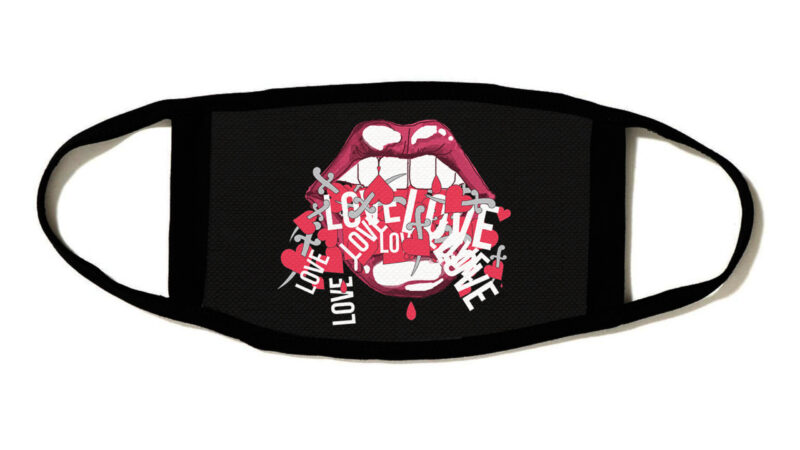
The coronavirus pandemic has challenged the fashion theory that we wear clothes for ourselves rather than for others. For many, the result has been weeks in tracksuits and pyjamas, while others cling to their routine of getting dressed as a way to retain a sense of normalcy.
But while the fashion world grinds to a halt, this time has opened up new outlets for creativity and design. The newest must-have item on everyone’s wish-list is a face mask. As governments across the globe recommend wearing fac masks on public transport and in supermarkets, designers have shown that this practical and potentially life-saving attire need not be purely clinical.
Natalie B Coleman is a Dublin-based designer who is creating fashion face masks and bringing beauty to our newfound barriers.
Coleman, inspired by the work produced by Creatives Against Covid19, sought a way to respond to the crisis. Her decision to venture into fashion face masks was practical as well as creative. The production of the masks provides employment for seamstresses and a portion of the profits are donated to Women’s Aid.
It’s keeping people busy and keeping people in equity and giving money to a really amazing charity
Coleman tells me that mask production is multifaceted: “It’s keeping people busy and keeping people in equity and giving money to a really amazing charity.”
Coleman tells me that masks can be threatening, so she wanted to make them “beautiful and fun”. She has created two styles of masks. The first are hand sewn, some made with remnants of fabrics that were left over from other designs. These pieces are intricate, one made from silk and delicate floral lace, another in emerald green, with frilled edges and with long silk ties that can be made into elegant bows.
Coleman’s newest masks are printed designs made from 100 per cent organic cotton. One mask’s graphic depicts an open mouth overflowing with hearts and the word “love”. Coleman says that her masks are “about conversation”. She says that although masks can prevent conversation, they can also become a talking point, bringing fun and humanity to the division in place.
The decision to donate a share of the profits with Women’s Aid was an easy one for Coleman: “What Women’s Aid do is incredible … they do amazing work for women in abusive homes.”
We really do need to slow down … there’s just too many clothes, and there’s too much fast fashion, too many things in landfills
Particularly at this time, she says, domestic abuse is more horrifying than ever. “Just to think about women who are in this situation, mostly women and kids – that going out to work, or the abuser going out to work – that refuge is gone. It must be hell.”
I ask how the process of manufacturing has been affected by quarantine – will her materials eventually run out? Coleman tells me that the maska are all limited edition, “so as soon as the fabric runs out, then we’ll just switch up the designs”. This isn’t necessarily a drawback, and Coleman finds a way to make fabric shortages a positive: “It’s kind of fun to have things run out and come up with something new anyway.” The artisan masks are being made by seamstresses at home, who are wearing gloves and masks while sewing the silk and print fabrics, while the printed masks are made within a printing facility.
Coleman says her design process is “generally a response to what is going on. The last collection, ‘Sisters’ [collaboration with the United Nations sexual and reproductive health agency], was quite feministic because I was finishing a master’s in gender and women’s studies”.
However, Coleman’s masks perform a scientific function, so they required that her design process follow specific protocol: “You need the two layers, and they have to be natural fabric, and a tight weave. We have a pocket so people can put a filter inside if they want.” Luckily, these practical restrictions do not seem to have hindered her creativity.
Just to think about women who are in this situation, mostly women and kids – that going out to work, or the abuser going out to work – that refuge is gone
In terms of the wider fashion industry, “the whole season is a write-off”, Coleman says. But she hopes this will allow for change within the fashion industry. “We really do need to slow down … there’s just too many clothes, and there’s too much fast fashion, too many things in landfills, and people are not paid properly. It really is time to change.”
I ask how she sees the world post-coronavirus. She is concerned “about the effect on kids and mental health after COVID – will we ever hug strangers again? Will things go back to normal? I can’t imagine going on a plane for a weekend away just for fun, that now seems like a really indulgent thing to do”.
Many of our outlets for indulgence have been severely limited during lockdown, but an investment into one of Coleman’s masks is a practical indulgence, bringing beauty to an otherwise intimating restriction and helping to support a vital charity.






